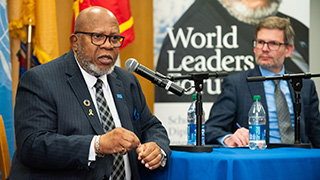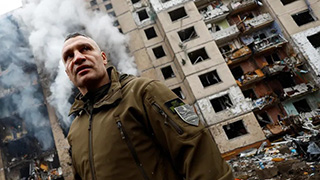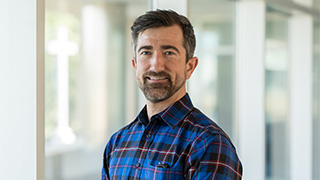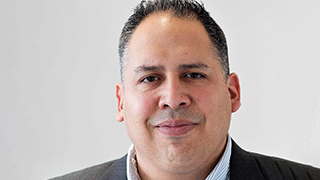Three Star General Speaks with National Security Fellowship
Monday, January 30, 2023
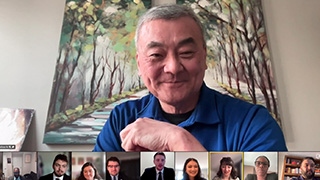
Lieutenant General Michael Nagata speaks with students.
On Monday, January 16th, the National Security Fellows met with retired Lieutenant General Michael Nagata as he provided insight from his 38-year Active-Duty career, with 34 of those years serving in US Special Forces Operations. As a former commander of Special Operations Command (SOCCENT), this year’s National Security Fellowship (NSF) partner, General Nagata discussed operational nuances and helped students better understand how policy and policymakers address and consider military objectives.
For its sixth year of operation, the NSF team, under the guidance of alumnus and Department of Defense advisor Mohamad Mirghahari, is working with SOCCENT to provide research and recommendations into how the US can leverage sectors like culture and economics in the Central Asian states. Mr. Mirghahari hosts distinguished guest speakers with either regional knowledge or operational knowledge to guide the students through their research. General Nagata’s extensive military background and leadership, coupled with his regional and operational experience, provided the students with a unique firsthand perspective in support of their research project.
LTG Nagata began his conversation by providing a short lecture outlining his experience, the challenges facing the US government today, and the threats facing the Central Asian region. While the region is roughly the size of Western Europe, it has a significantly smaller population density and enormous economic disparity. Throughout the centuries, Russia and China intervened and assisted the Central Asian states causing dependencies and narrowing opportunities for outside actors like the US to become involved. However, during the twenty-plus years of the US and International military campaign in Afghanistan after 9/11, the US depended heavily on the Central Asian States to provide logistical basing, access, and overflight for the enormous logistical efforts required.
In the wake of the precipitous US withdrawal from Afghanistan in 2021, LTG Nagata believes a renewed "arc of instability" has been forming across much of EURASIA (and largely encompassing the Central Asian States). The military weakness that Russia has demonstrated in its troubled invasion of Ukraine to the west, combined with the renewed tensions between the US and its allies against China to the east, are creating regional challenges and doubts for Central Asian States about whether either of these traditional "great powers" of the region can be relied upon to provide stability and predictability the comparatively weak CAS states always need. Those doubts can be both a "source of strategic trouble" for the region, as well as a possible opportunity for the United States to advance its own interests, but it remains to be seen what US policymakers are willing or interested in doing across this vast expanse.
Tailoring the second part of the discussion to the NSF team’s questions to inform their project and presentation audiences, General Nagata provided an analysis of how violent extremism, Russian influence, and capabilities have changed in the region over time. As students looked for opportunities to increase US involvement in the region, General Nagata emphasized the importance of the historical precedence of being a generous nation and the unexpected benefits of that generosity.
Second-year graduate student Peter Roberto commented that "Speaking with General Nagata was an incredible experience. His experience with the region and government work was truly felt, and his ideas about what the world and the US need will embolden some of my recommendations for defense."
First-year graduate student Jaasiel Forde echoed that sentiment and said, "The presentation from General Nagata was insightful, to say the least. He not only helped focus our research, but he also imparted knowledge about the operations of US government agencies that gave context for the team to develop better solutions to our research problem."
National Security Fellowship Professor Mohamad Mirghahari added: "It was an honor for our program to have General Nagata meet with our students. General Nagata’s experience and leadership, not only at SOCCENT, but on the Joint Staff, National Counterterrorism Center, and across the government throughout his years, provided the students with a rare opportunity to learn from a leader who has worked in many different facets of government."
This year’s National Security Fellowship team consists of eleven graduate students from Seton Hall University’s School of Diplomacy and International Relations. Team leaders Christina Grossen and Alli Risewick are leading Matthew Enterline, Peter Roberto, Brent Findon, Jaasiel Forde, Anneliese Preske, Zane Cawthon, Joshua Smith, and Del Sanders as they work to finalize their report and gear up for presentations to SOCCENT and other agencies later this academic year. The National Security Fellowship team at Seton Hall would like to thank General Nagata for donating his time and expertise.
Learn more about the National Security Fellowship here.
Categories: Nation and World


